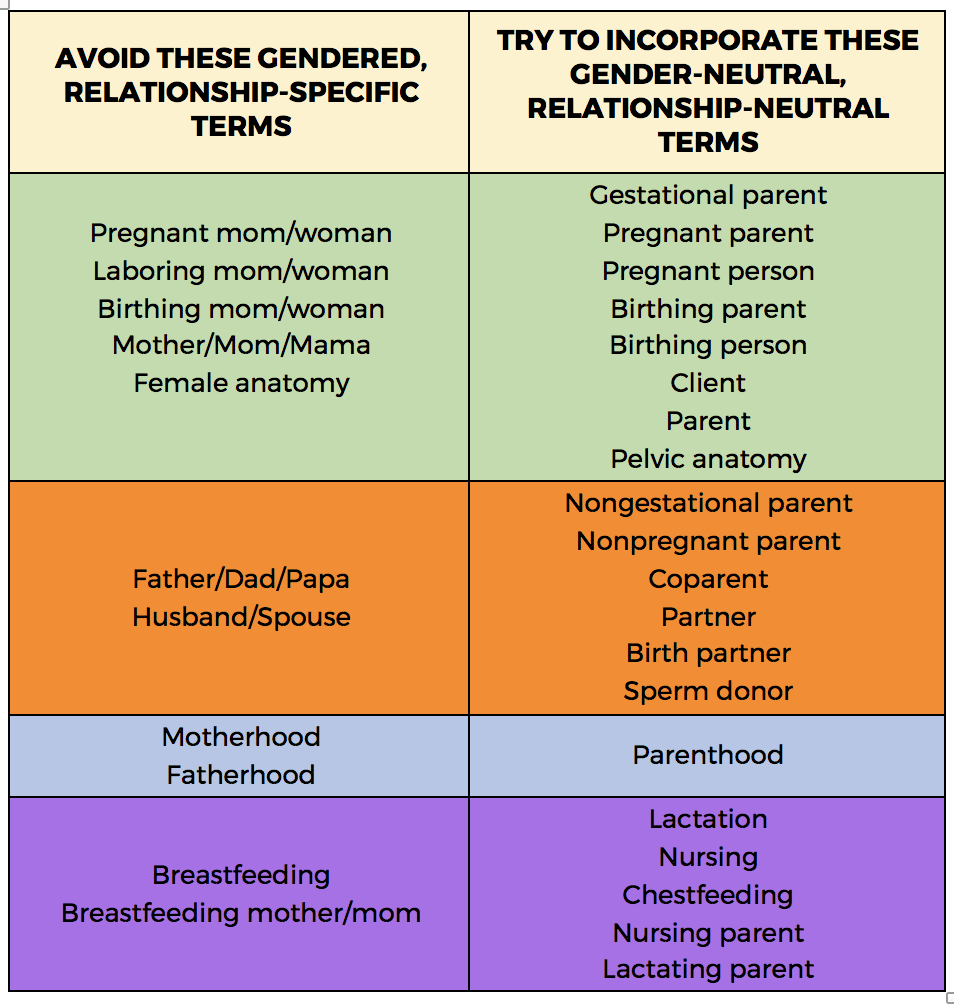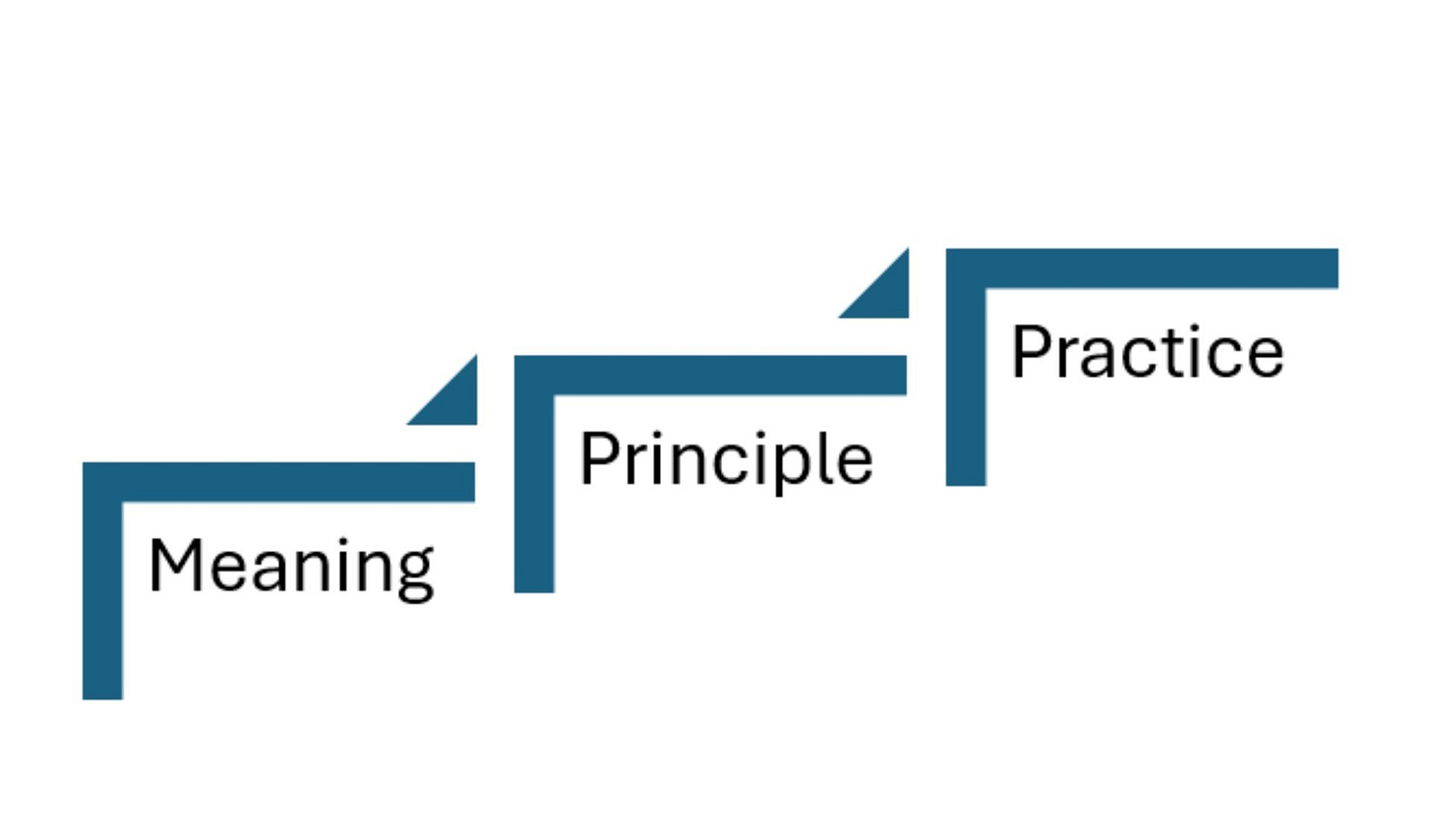As our culture descends further into a state of moral anarchy, it is important to identify the tools that are used to facilitate the plunge. The main tool is the infinitely inventive and boundlessly woke newspeak that seems to proliferate the culture at warp speed. This new Orwellian parlance is used to facilitate a quick and easy 3-step process. Below is a free guide that you can use to help you get started today. THAT’S RIGHT! in just 3 simple steps, you can EASILY achieve complete and utter meaninglessness.
Step 1. Meaning. Words have objective meaning and we generally agree on the meaning of those words.
Step 2. Anti-meaning. There is a complete breakdown of meaning and agreement on the definition of words. New words/phrases are created in an effort to create new meaning. But somehow, these new words actually mean the opposite of what they sound like they mean.
Step 3. Meaninglessness. Words begin to mean absolutely nothing. Our ability to communicate with each other falls apart. We talk past each other and descend further into the crisis of meaning.
Step 1. Meaning
There was a time when basic words like “person” or “woman” had an objective, shared meaning. When someone said the word “woman,” no one had to ask clarifying questions or wonder if the person they are speaking with knows what that word means. Of course, with all words there was always room for some healthy debate. But just about everyone shared a basic understanding that “woman” did not mean “man.”
Unfortunately, this is no longer.
Step 2. Anti-meaning
This unfortunate reality, this breakdown of meaning and shared understanding, first creates a state of exhaustion, then a sense of alienation, then a spirit of suspicion, and finally, division.
You become exhausted by constantly doing mental gymnastics in social settings. Previously, you didn’t have to spend any time or effort wondering if you and your neighbor agreed on what a woman or a person was. Now, you realize that this starting place of agreement you once had, might be gone. You don’t want to offend them, and are now forced to spend a lot of mental energy on figuring out if you and this person are on the same page or not.
You start to experience a sense of alienation in your communities. You’re no longer sure if you agree with friends and loved ones on basic components of reality. Your sense of belonging starts to decay. You ask yourself “do I still belong here?” You’re not sure.
An unwanted spirit of suspicion is palpable. It’s triggered by strange thoughts like “did my friend really just say that men can get pregnant?” Or “why did they just say ‘pregnant person’ when they meant ‘woman’ or ‘mother’.” And finally, “am I able to trust this person’s judgement in any real sense?”
Or, maybe you start to feel like you’re the crazy one.
The saddest of all the questions you start to ask yourself is “can I honestly say that I share any real sense of unity with this person, considering how fundamentally different we see things?”
And then, division sets in. You may still be “friends,” you may still work at the next desk or sit in the same pew, you may still joke and laugh together, you may even still talk about personal things sometimes. But, because of this deep loss of meaning and agreement, a fault line has been breached. And the problem feels unsolvable.
While all this is happening, you begin to witness a strange new vocabulary emerge. New words are offered in place of old words that meant something to you. Short, clear and concise words are replaced with longer, unclear, therapeutic words. You realize that although these words are in fact from the language you speak, they’re awkward and foreign sounding, almost as if they come from a completely different language.
There is a deceptive hue to the new language, as if it needs to be interpreted in order to be properly understood. Here are some examples of new words you hear followed by a more honest and correct interpretation,
·“Gender affirming care” is the new version of “sex change operation” but the most concise translation is “sex denial harm”
·“Misgendering,” is now an evil thing that used to be a normal thing known as “using someone’s correct pronouns”
·“Reproductive justice” correctly translated simply means "abortion,” or maybe a better translation in this case is “unjustly ending a normal reproductive function.” The most clear version would be “killing a baby”
·“Justice involved person” (perhaps the best example of “anti-meaning”) is a new and very odd way of saying “convicted criminal”
·“Minor attracted person” or “MAP,” is a highly clever linguistic device that actually means “an adult who is sexually attracted to a child.” Both of these are less clear derivatives for the much clearer, original word “pedophile”
·“Undocumented migrant” is the fresh 2.0 version of its prototype “illegal alien”
This new vernacular transcends euphemistic. As Judith Butler -senior editor of the woke glossary- admits, when we use this new language, “we are talking about the changing of reality.”
The strangest thing about the new vocabulary is that the actual meaning of these new words is the exact opposite of what they sound like they mean.
For example, a “justice involved person” sounds like it means someone who is involved in activities that are fair and just, but it actually means “convicted criminal,” which, in the real world, signifies someone who is engaged in precisely the opposite of just and fair activities.
In an attempt to communicate something older in a newer way, the end result is that you communicate nothing at all.
George Orwell once said this is when “words and meaning have parted company.”
Words begin to mean the opposite of what they sound like they mean, then they start to mean nothing at all.
This leads to our final step.
Step 3. Meaninglessness
The original meaning of the old words + the anti-meaning of the new words cancel each other out to equal zero.
We talk past each other and become like ships in the night. We use different words than each other and speak in different frames. We are conversationally and semantically lost. Our ability to effectively communicate with each other falls apart.
Like in the story of the Tower of Babel, our language is confused and we are unable to understand each other.
Genesis 11:9 reads, “Therefore its name was called Babel, because there the Lord confused the language of all the earth.” The next verse completes the dark sequence of events. “And from there the Lord dispersed them over the face of all the earth.”
We are scattered, and divide into factions.
Maybe there are people you used to be very close with, but they now adopt some of the new language and ideas and you no longer share a basic sense of agreement, so you drift apart.
Maybe there are people who you were not as close with before, but you haven’t lost this critical sense of agreement with them, so you gravitate towards them.
All is not lost
We can work to mend some of what has been torn apart. It is equal parts difficult and important to have these kinds of conversations today, but we must. It is important for us to talk with one another and gently and respectfully attempt to locate points of disagreement.
However, before we attempt to do that, I think it is important to look at the hidden structure of these conversations, and the different levels upon which we agree or disagree.
I made an image to illustrate. Agreement or disagreement usually happens on two levels: a deeper/lower level that I’ll call the level of principle and a more surface/upper level I’ll call the level of practice.
When I say principle, I am talking about our personal values. And when I say practice, I mean how we practically apply those values in the real world situations we find ourselves in. And of course, people can and often do agree in principle but disagree in practice. For example, two people can agree on a value like caring for the poor, but disagree very much on how to apply that belief in their life.
But in conversations today, there is another even deeper level that often goes unnoticed and unacknowledged. This I will call the level of meaning.
In conversations today, I will find myself agreeing with a person’s values and maybe even their application of those values, but the more we talk, the more I realize that this person and I do not agree on the basic meaning of the words that frame our conversation.
For example, I could be speaking with a friend who claims they are pro life and believes that the killing of innocent people is wrong and should be illegal. So far so good, it seems that we basically agree in both principle and practice.
But then I learn that my friend does not believe that a “person” is a person until 20 weeks into the pregnancy. To my friend, "terminating a fetus” that is 19 weeks old is not killing a person, because there is no person there to be harmed.
This is because my friend defines the word “person” as one who has the ability to be conscious or sentient or feel pain, which becomes possible around 20 weeks gestation.
So, it becomes clear that although my friend and I basically agree in both principle and practice, we disagree on the definition of the word that holds together our entire conversation, therefore we disagree on an even more fundamental level, the level of meaning.
Now, any sense of agreement or commonality we had begins to unravel; any hope of common ground or unity we had, begins to slip away.
It now seems as though we are worlds apart.
What can we do?
Best practice in these conversations is, in a spirit of charity and grace, ask questions that get to the root of the issue as soon as you can. Questions that clearly define the terms like, “what do you mean when you say ‘person’?” Try to locate the ways in which you and your friend are defining terms differently, and the different premises that flow from that as in the abortion example above.
Stay engaged. Don’t be a jerk, but don’t back down.
This would also be a good time to practice Dr. John Seel’s (Covenant Theological Seminary) model for cultural engagement (starts minute 12:45). I talk about it at the end of an earlier post, but it goes
1. Humanize the person
2. Engage the issue
3. Elevate the conversation
4. Reframe the conversation and
5. Ground the conversation in truth.
Learning and following this model can help us persuade those we care about to a truer position and help us all move closer together.
Was this post helpful?
Thank you so much for reading. If you read this and have a thought, please leave a comment here or email me (below). My primary motivation for writing is to create more good conversation around cultural, theological and political issues. I would love to hear your thoughts.
jeffreycharlescaldwell@gmail.com








Jeff,
That was a wonderful way to start the celebration of my "birth-week". I am reading a very scholarly work right now that takes considerable back and forth to grasp the concepts. I am glad your writing does not require the same effort. You stated a concept which was close to one in my reading. You did it simply. Thank you...
Shalom, Joe
Jeff,
Your writing is spot on! Love it & Love you & A.
SLR